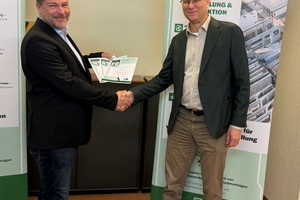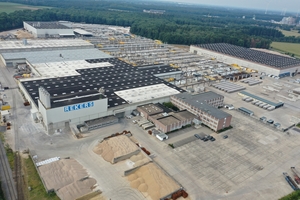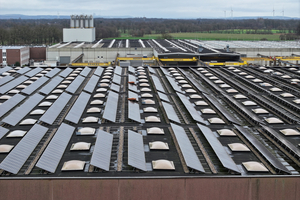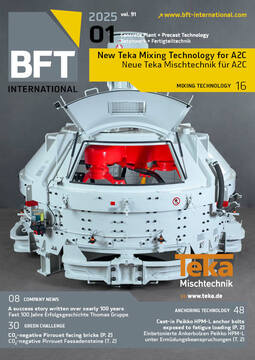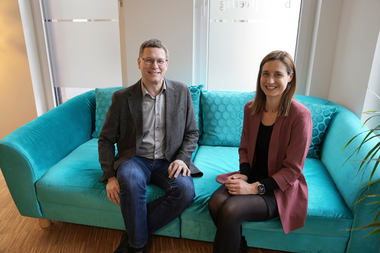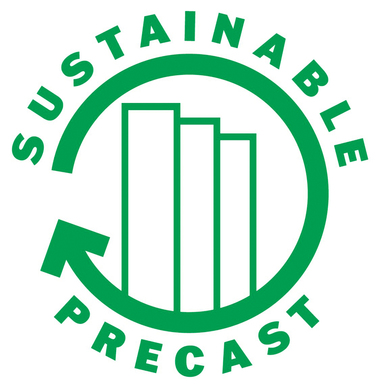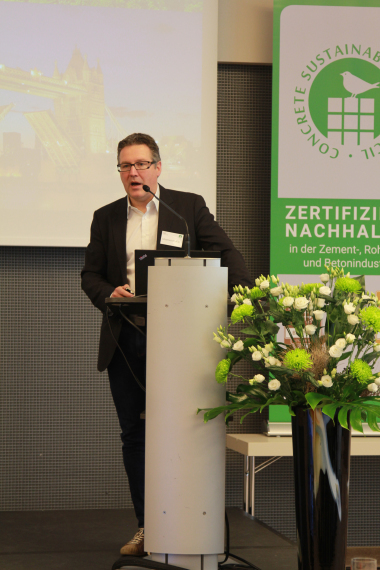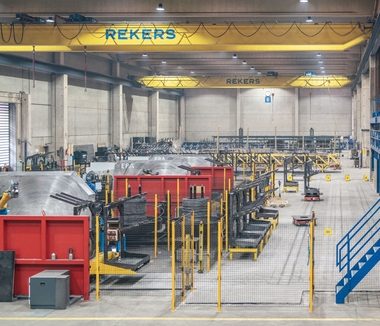Interview: Three Sustainable Precast certificates awarded to Rekers Betonwerk
We previously featured the Sustainable Precast Certification (SPC) program that supports the industry on its route toward a sustainable future in our April 2024 issue. At the general meeting of Bund Güteschutz Beton- und Stahlbetonfertigteile e. V. (Association for Quality Control of Concrete and Precast Reinforced Concrete Components) held in Weimar, Rekers Betonwerk GmbH & Co. KG headquartered in Spelle in the German State of Lower Saxony was the first business to receive the Sustainable Precast certificate in all three SPC areas (concrete, precast components, and precast assembly). The certificates were issued by BAU-ZERT e. V.
BFT International: Hello Mr. Rekers, hello Dr. Pott, I am pleased to be able to ask you a few questions on the occasion of your comprehensive SPC certification. First off, Mr. Rekers, I would of course like to congratulate you on successfully completing the certification process. I assume that this involved a certain amount of work for you in the company. Why did you decide to apply for SPC certification nonetheless? Why do you see this as an opportunity? What was your underlying motivation?
Dipl.-Ing. Ulrich Rekers: Hello Ms. Knitter, thank you very much for your congratulations. We at Rekers Betonwerk would like to document our development towards enhancing sustainability in a manner transparent to the public. We are concerned not only with the material, but also with the manufacturing process and the assembly of our precast elements. Our customers are increasingly seeking to get their buildings certified. For this purpose, they require reliable proof from their suppliers, including us, of the sustainability of the products used. The SPC certificates enable us to not only guarantee this ourselves, but to also have it confirmed externally.
BFT International: This certificate has become common proof of sustainability in the three areas relevant to precast plants: concrete, precast components, and precast assembly. You were certified in all three areas. Has this been done in a single procedure, or were these separate certification processes? And how long did it take?
Dipl.-Ing. Ulrich Rekers: The requirements for certification in the three areas are divided into modules. Since we opted for certification in all three of them, all modules were examined holistically in a single procedure. In principle, it would also have been possible to have only individual areas certified. However, this would have contradicted Rekers Betonwerk’s holistic approach to sustainability.
The certification process took about nine months overall because we needed to document a lot of things. However, we didn’t deal with it on a daily basis. But it would certainly also have been possible to complete the process a bit more quickly.
BFT International: Sustainable Precast scrutinizes social, environmental, and economic aspects. Have you implemented specific measures to meet these requirements? Does Rekers Betonwerk GmbH & Co. KG have a specific sustainability strategy or perhaps even a dedicated sustainability department?
Dipl.-Ing. Ulrich Rekers: We have been working on sustainability for quite some time now. That’s why we haven’t had to implement many changes to our processes. For certification, compliance with the requirements must of course be documented in a verifiable manner. We still had to invest some effort here in particular. One of our employees oversees sustainability and involves the individual departments if required. Fortunately, we don’t need to set up a separate department for sustainability for this purpose.
BFT International: Based on your own experience with SPC, would you also recommend your industry peers to envisage certification? And if so, what tips would you like to share in this regard?
Dipl.-Ing. Ulrich Rekers: Based on our experience, I would definitely recommend addressing the issue of sustainability. The SPC system requirements provide good guidance for this. If you follow them, SPC certification will eventually be just a relatively small additional step. However, it’s important to practice sustainability continuously within the business, rather than just temporarily for the certification process.
Let me share another piece of advice: Don’t let yourself be put off by the large number of questions. Many companies in our industry probably meet some of the requirements already, so the challenge lies primarily in preparing the appropriate documentation. However, there are still quite a few requirements that you need to address in terms of substance. But these are probably fewer than you think when you first look at the documents.
BFT International: My next question is for you, Dr. Pott: In our last interview, you estimated that only about 10% of precast producers already largely fulfill both the requirements and the specifications for verification and documentation. Does that mean that Rekers is among these 10% most sustainable companies in our industry?
Dr.-Ing. Jens Uwe Pott: Yes, I think so. As a matter of course, now that the first certification processes have been completed, we still don’t have an overview of the industry as a whole. But sustainability is mainly a question of being willing to implement it. At Rekers Betonwerk, just like for the other companies certified to date, sustainability has been a clear commitment for a long time, rather than only since the start of the certification process. Accordingly, the sustainability efforts made by the business are relatively far advanced, which also clearly shows in the certification process.
BFT International: How great is the general interest in Sustainable Precast? More specifically, how many companies have applied for certification so far and how many of them have actually been certified?
Dr.-Ing. Jens Uwe Pott: The three certification bodies have received a whole series of inquiries already, which means that the interest is definitely there. By early December 2024, a total of nine certificates had been awarded to six companies. Further companies and production sites are currently undergoing the process. Since this is the responsibility of the individual certification bodies, I am not in a position to provide more accurate information on the numbers and the process status at this point. Also, certification procedures are subject to a certain degree of confidentiality.
BFT International: What do other interested precast producers need to do now if they also want to be certified?
Dr.-Ing. Jens Uwe Pott: In the first step, companies should familiarize themselves with the requirements of the SPC system. These can be downloaded from the Sustainable Precast website at www.sustainable-precast.de. Businesses can refer to the requirements to get a first overview of where they stand in terms of sustainability or where there are still deficits. If the company is convinced that it meets a substantial proportion of the requirements, particularly the minimum requirements, the next step should be to contact one of the three accredited certification bodies. They will then provide the necessary information on the further certification process.
BFT International: Thank you very much for this interesting and honest interview.
Interview: Karla Knitter, M.Sc.
CONTACT
Bund Güteschutz Beton- und Stahlbetonfertigteile e. V.
Gerhard-Koch-Str. 2 + 4
73760 Ostfildern/Germany
Dr.-Ing. Jens Uwe Pott
+49 5139 9994 40
Rekers Betonwerk GmbH & Co. KG
Portlandstr. 15
48480 Spelle/Germany
Dipl.-Ing. Ulrich Rekers
+49 5977 71 260

